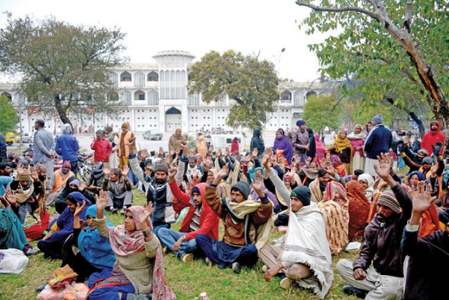KARACHI: Highlighting the plight of sanitation workers, rights activists at a press conference held on Thursday demanded that the government regularise their jobs, grant them facilities that were given to employees of government departments and ensure that they were provided with safety kit at work.
They also called for an end to discrimination they frequently faced at the place of their employment and society’s derogatory attitude towards them.
“Sanitation workers deliver vital services in society. Unfortunately, however, neither society nor the government is willing to treat them with respect and address their issues affecting their life and families for decades,” said Shafiq Ghori, president of the Sindh Labour Federation.
Explaining these problems, he said sanitation workers worked on contractual basis and, therefore, remained deprived of key fundamental rights, for instance, the right to medical facility or health insurance — which could provide some monetary support to families, especially whose loved ones die or suffer injury while cleaning sewers.
Activists call for end to discrimination against such workers
“Sanitation workers are very vulnerable to death, injury and illness as they work in degraded environmental conditions, at times toxic. The local media has recently reported death of some sanitation workers in Umerkot, Hyderabad and Karachi,” he said.
Injustice in govt depts
The speakers referred to the National Sanitation Policy 2016 and Sindh Sanitation Policy 2017 which, they said had no mention of sanitation workers who otherwise were the main stakeholders in this sector.
They urged the government to take representatives of sanitation workers on board before designing such policy documents, incorporate their concerns to avoid any gaps in a policy that ensured protection of their rights.
They also spoke of injustices at government institutions and said sanitation workers in union councils, town municipal administrations, district councils and municipal corporations had been working without regularisation for 20 years.
“They are being deprived of wages as prescribed in the government rules and are being paid Rs14,000 or less against Rs17,500 set as the minimum wage for unskilled workers [by the government],” said Pirbhul Satyani, regional coordinator at Strengthening Participatory Organisation in Hyderabad.
The organisation and Sindh Human Rights Commission, he pointed out, had provided safety kits to 250 sanitation workers. Such kits should be provided to all sanitation workers, he demanded.
Zahid Farooq of Urban Resource Centre, Karachi, said since 1994 no appointment had been made in this sector on regular basis and sanitation workers were recruited only on daily wages, which deprived them of many fundamental rights.
“These contractors do not take responsibility while workers die during duty or get injured. The government must regularise them and provide them with pension and packages as per laws.
“Contractors should be made bound to register these workers with social security institutions and Employees Old Age Benefits Institution so they may get medical facilities, pensions and other benefits,” he said, adding that a family should be compensated with Rs500,000 in case of workers’ death.
Discrimination, he said, was rampant in this sector as employers set wages of the staff according to their own whims.
The government must declare discrimination a crime and bring offenders to justice, he said.
Asked about any reliable data on the number of sanitation workers, Boota Imtiaz, a community activist, said the government had been approached a few times on this subject but it didn’t share any information.
Karamat Ali of Pakistan Institute of Labour, Education and Research informed journalists that a petition had been filed in the Sindh High Court, seeking implementation of laws pertaining to the fundamental rights of workers in this sector.
Published in Dawn, December 20th, 2019












































